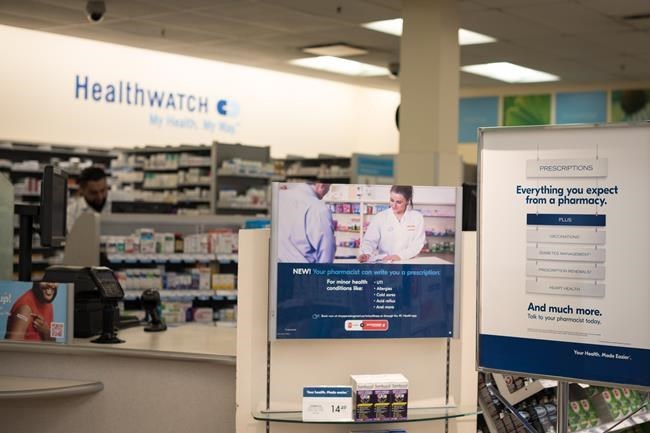TORONTO — Pharmacists in Ontario can now diagnose and treat 19 common ailments but they still can't prescribe birth control or emergency contraception.
”We would like to see that implemented sooner rather than later," Justin Bates, CEO of the Ontario Pharmacists Association, told The Canadian Press.
"I think it's a particular miss not to have emergency contraception and birth control" on the list of prescriptions the province's pharmacists are allowed to prescribe, Bates said.
According to data from the Canadian Pharmacists Association, pharmacists in all provinces except Ontario, Manitoba and the three territories can prescribe birth control and emergency contraception.
Bates' comments came after the Ontario government said Sunday it had expanded pharmacists' prescribing powers to include medication for acne, canker sores, diaper rash, yeast infections, parasitic worms and nausea and vomiting in pregnancy.
Those six conditions are in addition to 13 common ailments Ontario pharmacists were already allowed to prescribe treatment for since Jan. 1, including pink eye, menstrual cramps and urinary tract infections.
While the addition of six more conditions to the pharmacists' scope of practice is "welcome," Ontario is "still lagging the other provinces," Bates said Monday, noting that pharmacists in several other jurisdictions can prescribe for around 30 conditions.
In Alberta, pharmacists can assess most conditions and prescribe drugs to treat them. They can also give all routine vaccinations.
Ontario pharmacists are on their way to catching up with their counterparts in other provinces, said Barry Powers, acting chief pharmacist officer at the Canadian Pharmacists Association.
He said the Ontario College of Pharmacists' board approved a proposed list of 17 more conditions and medications on Sept. 19 as a recommendation to the province's ministry of health.
That list includes pharmacist prescribing authority for birth control and emergency contraception, as well as for ailments that include insomnia, head lice and erectile dysfunction.
The recommendations will need to be circulated for public consultation before prescribing authority for those conditions will be granted, Bates said.
Public consultation for previous prescribing expansions has been online and lasts for 60 days.
It's not yet known when that consultation will happen this time, but the entire process likely won't be completed until sometime in 2024, Bates said.
Shelita Dattani, senior vice president of pharmacy affairs and strategic engagement at the Neighbourhood Pharmacy Association of Canada, said that granting pharmacists the ability to prescribe birth control and emergency contraception makes sense "from a public health perspective."
"Whether it's immunizations or birth control or naloxone or smoking cessation or any of those sort of health promotion, wellness, public health, harm reduction (strategies), access is key," Dattani said.
Pharmacists are often more accessible than other primary health-care providers such as family doctors, she said.
"When you have a health-care provider that you know you can see relatively easily, it seems like a perfect marriage," Dattani said.
According to Ontario's ministry of health, 89 per cent of the province's pharmacies have been assessing and treating common ailments since receiving prescribing authority at the beginning of the year.
Pharmacists are ready to do more, said John Papastergiou, an assistant professor of pharmacy at the University of Toronto and a pharmacist-owner of four Shoppers Drug Mart locations in Toronto.
Many pharmacies have adapted to the additional workload by hiring additional pharmacists and pharmacy technicians, he said.
"(Before) you might have in a relatively busy pharmacy, one pharmacist and a few technicians. Now at any given time if you come into my busiest store, I'll have like three pharmacists working," Papastergiou said.
"The demand for pharmacists has definitely increased but their skill set is very unique and they're well suited to do this," Papastergiou said.
His pharmacies all have private counselling areas where the pharmacist can talk to a patient about their condition and assess possible treatment, Papastergiou said, emphasizing that doesn't always result in a prescription.
These are the 19 conditions Ontario pharmacists can assess now: acne, canker sores, diaper rash, yeast infections, parasitic worms, pregnancy nausea, pink eye, acid reflux, cold sores, skin irritation, menstrual cramps, hemorrhoids, impetigo, insect bites, tick bites, hives, hay fever, sprains and urinary tract infections.
These are 17 conditions the Ontario college would like the ministry to add: birth control, emergency contraception, sore throat, calluses and corns, erectile dysfunction, mild headache, shingles, minor sleep disorders, fungal nail infections, swimmer's ear, head lice, nasal congestion, dandruff, ringworm, jock itch, warts and dry eye.
This report by The Canadian Press was first published Oct. 3, 2023.
Canadian Press health coverage receives support through a partnership with the Canadian Medical Association. CP is solely responsible for this content.
Nicole Ireland, The Canadian Press



